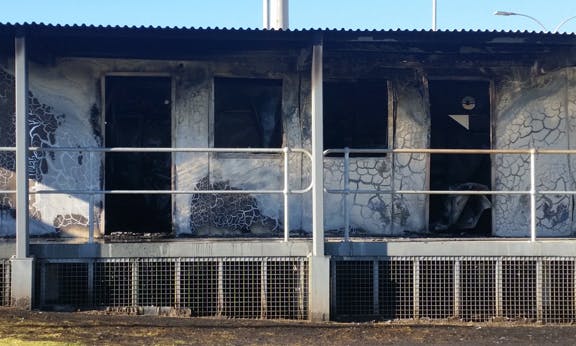Rioting refugees should be defended

A riot in Yongah Hill in Western Australia has again highlighted the appalling conditions in asylum seeker detention centres.
A suicide attempt by a 22-year-old Iraqi refugee, Saruuan Aljhelie, on 2 September resulted in protests and the burning of mattresses. Several days later, Saruuan died in hospital.
I have been visiting detention centres for more than nine years and have watched as conditions have deteriorated. Under the Labor government, a point system was introduced to maintain “order” in these prisons. When refugees failed to participate in an activity and disobeyed orders, points were taken away from them. They were then denied certain things – cigarettes to relieve the stress or a phone card to talk to their relatives, for example.
Under the Coalition government this system has morphed into more complex forms of punishment. A refugee who talks back to a guard might be transferred to a detention centre in another part of the country – sometimes thousands of miles away and far removed from the support network they may have formed while in detention.
That’s what happened to Saruuan Aljhelie. He was reportedly moved from Sydney to Perth several weeks ago, away from his family and two young daughters.
The threat of transfer or deportation, combined with the occasional racist comments from white guards, sexual harassment and a lack of care by the medical staff and impatient immigration officers, keeps the refugees in a very difficult situation. To make matters worse, we have had immigration ministers who have openly declared war on refugees.
I still remember the death of Shooty, an ASIO-rejected Tamil refugee in Sydney. He died after committing suicide in October 2011. Some refugees who took their lives were encouraged by the detention centre guards to jump off the roof to their death.
The death of Reza Berati on Manus Island should have resulted in criminal charges against then immigration minister Scott Morrison. But the immunity enjoyed by our politicians helps them to get away with the violence they order in the name of “border protection”.
The comments and commentary by our elected representatives – every statement questioning the legitimacy of asylum seekers’ claims or, worse, the statements maligning them as criminals – have contributed to the deaths and self-harm attempts by refugees in our detention centres.
This is generally overlooked by our political system. We are asked to forgive the politicians because they supposedly are making “tough” decisions for worthy ends.
There are refugees who have been detained for more than nine years. Every time I visit them, they talk in code because they fear that the government will punish them further if they openly say negative things about their life in detention.
Refugees in detention know that even a small mistake could lead to a transfer away from their friends in detention or deportation to danger.
Why, then, would they riot?
Refugees are struggling for their freedom. But they are also struggling for survival. This is a battle against the thought of self-harm and suicide.
In April 2011, I visited a group of Tamil asylum seekers indefinitely detained in the Broadmeadows detention centre in Melbourne. This was after an attempted suicide by another refugee. They didn’t want me to leave – they feared themselves, not knowing whether they would survive the next day.
Perhaps at Yongah Hill, after so long, some decided that enough was enough. Perhaps people overcame their fears of the state and the punishment and took on their mighty enemy.
We should defend the rioting refugees. And we should intensify our campaigns to expose the violence of the state.
After all, a few burned buildings is nothing compared to the scarred souls and lost lives that the government is responsible for.